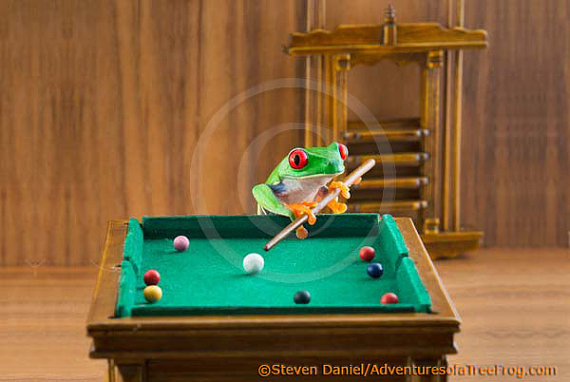As I started doing my research on the subject, I learned that is a difference between Pool and Billiards. I'd previously thought it was the same game. Pool, it turns out, is the common generic name in America for all cue sports. Games played on a pocketless table, Americans refer to as Billiards. In Europe, they refer to American games with pockets, as pocket billiards. Confused? Me, too. Technically, billiards is just another name for carom (A term new to me). In some countries, this game is referred to as carombole as it in in France, which is the origin of most cue games.
The history of billiards is long and rich. It's a game that has been played by kings and peasants, ladies and gentlemen, rich and poor. Actually, it turns out, that it evolved from a lawn game similar to croquet, played in northern Europe (presumably France) during the 15th century. Play was moved indoors and the table was covered in green cloth that was meant to simulate grass. The balls were shoved, rather than struck, with a wooden stick called a mace. The term billiard is derived from the French word billart, one type of wooden stick, or bille, which means ball.
Most of the early history comes from the kings and nobility who enjoyed playing the game. By the 1600's the game was popular enough among the commoners that Shakespeare mentioned it in this play, Antony and Cleopatra. A mere 75 years later, the first book containing the rules of the game was written and published in England. The author remarked that there were "few Tones of note therein which hath not a publik Billiards-Table." The cue stick was developed in the late 1600's. The handle was called a queue which means "tail." For a long time, only men were allowed to use a cue, while women had to use the older-version, a mace. The original tables had flat walls for rails that were meant only to keep the balls from rolling off the table. They resembled river banks and were, for a time, referred to as banks. It didn't take long for players to realize that the balls could bounce off the rails and begain deliberately aiming for them. Thus, a "bank shot" is one where the ball is made to rebound from a cushion as part of the shot.
In England, billiard equipment began to improve rapidly after 1800, partly because of the Industrial Revolution. The two-piece cue arrived in 1829. Many changes occurred to the table itself over the years, but the table as we know it today essentially came into being by 1850. Each country, through the years, has had their own "preferred" version of the game; English Billiards, American Four-Ball Billiards,and British Snooker.
The word pool means a collective bet, or ante. Many non-billiard games, like poker, involve a pool, but it became attached to the game of pocket billiards. A poolroom now means a place where pool is played but, in the 19th century, a poolroom was a betting parlor for horse races. Pool tables were installed to give patrons something to do between races.
While the term billiards seem to refer to all games played on a billiards table, with or without pockets, some folks take it to mean carom games only and use the term pool for pocket games. Either way, I'm still a bit confused as to which game my friends and I are playing this weekend. Nonetheless, it'll be fun to get off the ol' lily pad and do something different.
I hope your weekend plans involve spending time with your friends and family. Perhaps you might want to shoot a little pool on your "Tones publik Billiard-Table." It's just a thought....
Stay safe and I invite all of you back here here on Monday!

 RSS Feed
RSS Feed